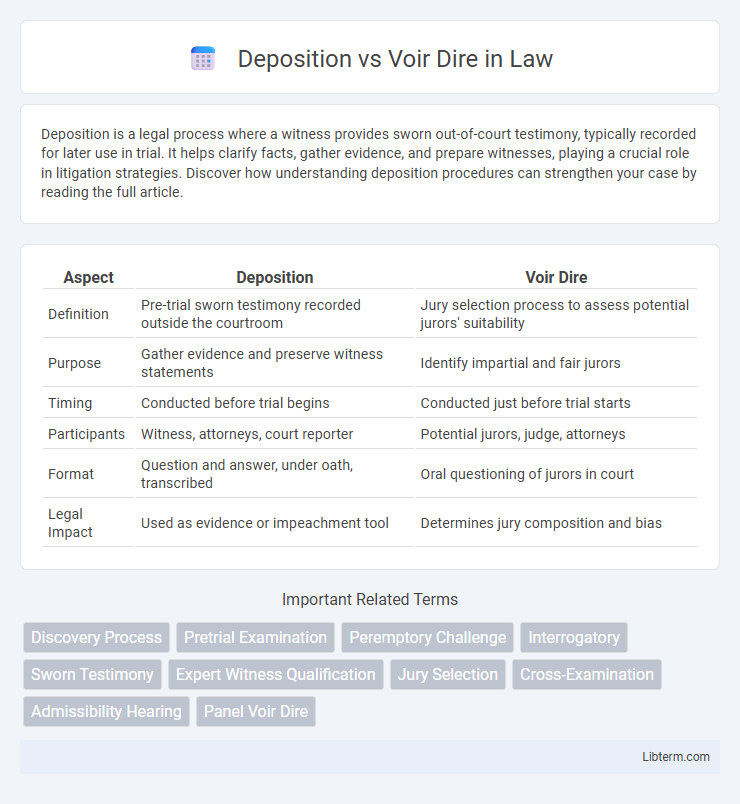Deposition is a legal process where a witness provides sworn out-of-court testimony, typically recorded for later use in trial. It helps clarify facts, gather evidence, and prepare witnesses, playing a crucial role in litigation strategies. Discover how understanding deposition procedures can strengthen your case by reading the full article.
Table of Comparison
| Aspect | Deposition | Voir Dire |
|---|---|---|
| Definition | Pre-trial sworn testimony recorded outside the courtroom | Jury selection process to assess potential jurors' suitability |
| Purpose | Gather evidence and preserve witness statements | Identify impartial and fair jurors |
| Timing | Conducted before trial begins | Conducted just before trial starts |
| Participants | Witness, attorneys, court reporter | Potential jurors, judge, attorneys |
| Format | Question and answer, under oath, transcribed | Oral questioning of jurors in court |
| Legal Impact | Used as evidence or impeachment tool | Determines jury composition and bias |
Introduction to Deposition and Voir Dire
Depositions are sworn, out-of-court witness statements recorded for later use in trial, allowing attorneys to gather detailed testimony and assess credibility before court proceedings begin. Voir dire is the jury selection process where attorneys question potential jurors to identify biases and ensure an impartial jury, crucial for a fair trial outcome. Both procedures play pivotal roles in shaping trial strategy by influencing evidence presentation and jury composition.
Definition: What is a Deposition?
A deposition is a pre-trial procedure in which a witness provides sworn out-of-court testimony recorded for later use in court or discovery. It allows attorneys from both sides to question the witness under oath to gather information, clarify facts, and preserve testimony. Depositions play a critical role in shaping case strategy by uncovering evidence before trial begins.
Definition: What is Voir Dire?
Voir Dire is a legal process during jury selection where attorneys and the judge question prospective jurors to assess their qualifications, biases, and ability to deliver an impartial verdict. This procedure aims to ensure a fair trial by identifying and excluding individuals who may hold prejudices or conflicts of interest related to the case. Unlike a deposition, which involves sworn testimony outside court, voir dire occurs before the trial to establish an unbiased jury panel.
Purpose of a Deposition in Legal Proceedings
A deposition serves as a pre-trial discovery tool where witnesses provide sworn testimony outside the courtroom to preserve evidence and assess credibility. It allows attorneys to gather detailed information, clarify facts, and evaluate witness reliability under oath. This process helps shape legal strategies by uncovering key details that affect case outcomes before the trial begins.
Purpose of Voir Dire in Jury Selection
Voir dire serves the critical purpose of jury selection by allowing attorneys to question potential jurors to assess their impartiality and suitability for a specific case. This process helps identify biases, preconceived notions, or conflicts of interest that could influence a juror's judgment. Unlike depositions, which gather sworn testimony from witnesses, voir dire focuses exclusively on evaluating jurors to ensure a fair and balanced trial.
Key Differences Between Deposition and Voir Dire
Deposition involves sworn out-of-court testimony used to gather evidence and assess witness credibility, while voir dire is the jury selection process aimed at identifying impartial jurors. Depositions are conducted by attorneys to obtain detailed factual information, whereas voir dire focuses on evaluating potential jurors' biases and suitability. The primary distinction lies in deposition's role in fact-finding and voir dire's function in shaping the jury panel.
Legal Processes: When Are Depositions and Voir Dire Used?
Depositions and voir dire serve distinct roles in legal processes; depositions are pre-trial sworn out-of-court testimonies used to gather evidence, clarify facts, and assess witness credibility, typically conducted during the discovery phase. Voir dire occurs in court before a trial begins, focusing on jury selection by questioning potential jurors to identify biases and ensure an impartial jury. Both procedures aim to protect fair trial rights, with depositions shaping trial strategy and voir dire ensuring unbiased jury deliberations.
Rights and Obligations of Participants
During deposition, all parties have the right to question witnesses under oath outside of court, with the obligation to answer truthfully and to produce relevant documents if requested. Voir dire involves the right of attorneys and sometimes parties to question prospective jurors to ensure impartiality, with the obligation to disclose potential biases and follow court protocols. Both procedures uphold the fundamental right to a fair trial while requiring participants to act in good faith and comply with procedural rules.
Practical Tips for Lawyers: Deposition vs Voir Dire
Lawyers should prepare for depositions by thoroughly researching witnesses and formulating open-ended questions to elicit detailed responses, while voir dire requires crafting targeted questions to efficiently uncover juror biases and ensure impartiality. Effective note-taking and adaptability during depositions facilitate the collection of valuable testimony, whereas voir dire emphasizes keen observation of jurors' nonverbal cues and responsive adjustments. Prioritizing clear, concise communication and anticipating opposing strategies enhances the effectiveness of both deposition and voir dire processes.
Conclusion: Choosing the Right Legal Process
Selecting between deposition and voir dire hinges on the legal objective: depositions are critical for gathering sworn witness testimony during the discovery phase, providing detailed evidence for case preparation. Voir dire serves to evaluate and select impartial jurors, influencing trial outcomes by shaping the jury composition. Understanding the specific role of each process ensures strategic decisions that optimize case effectiveness and trial readiness.
Deposition Infographic

 libterm.com
libterm.com